

WAGENINGEN UNIVERSITY 10/06/20 Thèse en ligne : Fraud investigation in the extra virgin olive oil supply chain - Identification of vulnerable points and development of novel fraud detection methods. Food Control Available online 20 January 2021 Emerging trends in olive oil fraud and possible countermeasures. Aparicio-Ruíz et al., 2017 R.
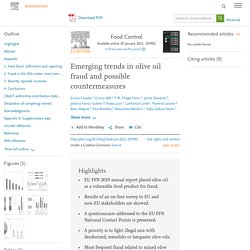
Aparicio-Ruíz, I. Romero, D.L. García-González, C. Oliver-Pozo, R. Food Chemistry, 220 (2017), pp. 42-50 Areté Research Consulting in Economics, 2020 Areté Research & Consulting in EconomicsStudy on the implementation of conformity checks in the olive oil sector throughout the European Union Azadmard-Damirchi and Torbati, 2015 S. Journal of Food Quality and Hazards Control, 2 (2015), pp. 38-44 Bajoub et al., 2018 A. Critical Reviews in Food Science and Nutrition, 58 (2018), pp. 832-857 Barbieri et al., 2020 S. Foods, 9 (2020), p. 862 Biedermann et al., 1996 M.
European Food Research and Technology, 202 (1996), pp. 199-204. Quím. Nova [online]. 2020, vol.43, n.7, pp.891-900. DETERMINATION OF THE AUTHENTICITY OF COMMERCIAL OLIVE OIL SAMPLES SEIZED IN THE ESPÍRITO SANTO STATE USING A PORTABLE SPECTROPHOTOMETER IN THE NIR REGION. Services on Demand Journal Article Indicators Related links Share.
![Quím. Nova [online]. 2020, vol.43, n.7, pp.891-900. DETERMINATION OF THE AUTHENTICITY OF COMMERCIAL OLIVE OIL SAMPLES SEIZED IN THE ESPÍRITO SANTO STATE USING A PORTABLE SPECTROPHOTOMETER IN THE NIR REGION.](http://cdn.pearltrees.com/s/pic/th/spectrophotometer-228594593)
SECURINGINDUSTRY 18/11/20 More olive oil firms turn to IBM to tackle fraud with blockchain. More olive oil producers have signed up with IBM’s blockchain-driven Food Trust to protect their brands from counterfeiting and food fraud, and to provide traceability for their customers.
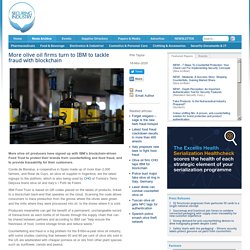
Conde de Benalua, a cooperative in Spain made up of more than 2,000 farmers, and Rolar de Cuyo, an olive oil supplier in Argentina, are the latest signups to the platform, which is also being used by CHO of Tunisia’s Terra Delyssa brand olive oil and Italy’s I Potti de Fratini. IBM Food Trust is based on QR codes placed on the labels of products, linked to a blockchain back-end that operates on the cloud. Scanning the code allows consumers to trace production from the groves where the olives were grown and the mills where they were processed into oil, to the stores where it is sold.
FOODS 20/02/20 Non-Targeted Authentication Approach for Extra Virgin Olive Oil. Food Control Volume 111, May 2020, Food fraud: Assessing fraud vulnerability in the extra virgin olive oil supply chain. 1.
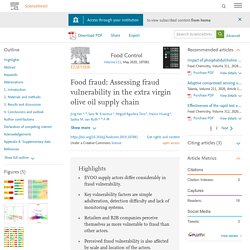
Introduction. AUSTRALIAN JOURNAL OF AGRICULTURAL AND RESOURCE ECONOMICS 04/08/19 An empirical framework to study food labelling fraud: an application to the Italian extra‐virgin olive oil market. The mislabelling of agricultural and food products is one of the most common types of food fraud.
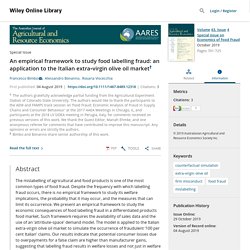
Despite the frequency with which labelling fraud occurs, there is no empirical framework to study its welfare implications, the probability that it may occur, and the measures that can limit its occurrence. We present an empirical framework to study the economic consequences of food labelling fraud in a differentiated products food market. Such framework requires the availability of sales data and the use of an ‘attribute‐space' demand model.
The model is applied to the Italian extra‐virgin olive oil market to simulate the occurrence of fraudulent ‘100 per cent Italian' claims. Our results indicate that potential consumer losses due to overpayments for a false claim are higher than manufacturer gains, suggesting that labelling fraud results in welfare losses and not just in welfare transfers. Food Control Available online 26 December 2019, Food fraud: Assessing fraud vulnerability in the extra virgin olive oil supply chain. INTECH 26/10/16 DNA-Based Approaches for Traceability and Authentication of Olive Oil. 1.
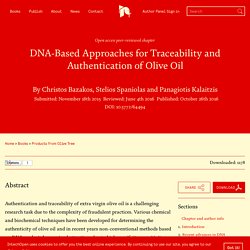
Introduction Olive oil is the main component of the Mediterranean diet and one of the most valuable food products of the agro-food industry, not only due to taste, but also due to high nutritional value [1]. Authentication and traceability of extra-virgin olive oil is a challenging endeavour that requires persistent efforts and continuous progress due to the complexity and advancement of novel fraudulent practices. Authentication uses methodologies, tools and technological platforms aiming at detection, prevention and exposure of adulteration and mislabelling of food commodities. Traceability is the ability to trace a food commodity from the production until the distribution stage (European Council regulation-EC 178/2002).
THE TELEGRAPH 14/01/19 Turkey accused of plundering olive oil from Syria to sell in the EU. EUFIC 01/12/16 Le projet européen OLEUM : Garantir la qualité et l'authenticité de l'huile d'olive. LA PRESSE 30/01/19 Attention à l'huile d'olive falsifiée. JOURNAL OF GENETICS - SNP marker analysis for validating the authenticity of Tunisian olive oil. PARLEMENT EUROPEEN - Réponse à question E-000716-17 Counterfeit extra virgin olive oil. The Italian antitrust authority has imposed penalties on a number of large producers for selling counterfeit extra virgin olive oil in supermarkets.
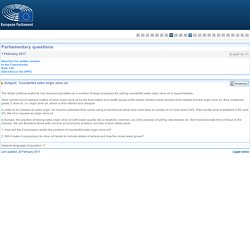
Tests carried out on sample bottles of extra virgin olive oil by the food safety and health squad of the Italian military police showed that instead of extra virgin olive oil, they contained grade 2 olive oil, i.e. virgin olive oil, which is less refined and cheaper. In order to be classed as extra virgin, oil must be extracted from olives using a mechanical press and must have an acidity of no more than 0.8%. If the acidity level is between 0.8% and 2%, the oil is classed as virgin olive oil. In Europe, the practice of mixing extra virgin olive oil with lower-quality oils is relatively common, as is the practice of selling ‘deodorised oil’, the most elaborate form of fraud in the industry. We are therefore faced with not only an economic problem, but also a food safety issue. 1. 2. AUSTRALIAN JOURNAL OF BASIC AND APPLIED SCIENCES - 2009 - Classification of edible oils and uncovering adulteration of virgin olive oil using FTIR with the aid of chemometrics.
MERCOLA 17/12/16 Is Your Olive Oil Fake? By Dr.
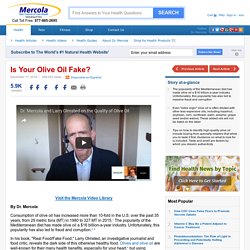
Mercola Consumption of olive oil has increased more than 10-fold in the U.S. over the past 35 years, from 29 metric tons (MT) in 1980 to 327 MT in 2015.1 The popularity of the Mediterranean diet has made olive oil a $16 billion-a-year industry. Unfortunately, this popularity has also led to fraud and corruption.2,3. BLOG USDA 11/05/16 Safeguarding Consumers from Olive Oil Fraud. J Agric Food Chem. 2009 Jul 22 Rapid authentication of olive oil adulteration by Raman spectrometry. OLIVE OIL TIMES 16/02/17 Italy Arrests 33 Accused of Olive Oil Fraud. Italy’s Carabinieri arrested 33 suspects in the Calabrian mafia’s Piromalli clan, a criminal enterprise whose illicit dealings allegedly include exporting fake extra virgin olive oil to the United States.
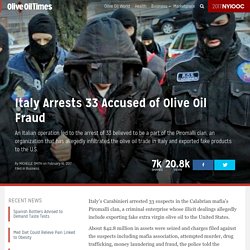
About $42.8 million in assets were seized and charges filed against the suspects including mafia association, attempted murder, drug trafficking, money laundering and fraud, the police told the Investigative Reporting Project of Italy. The Calabrian mafia, also known as the Ndràngheta, is believed to be the wealthiest, most powerful criminal network in Italy, and the Piromalli are believed to be a leading clan within that organization. In addition to drug trafficking, authorities believe they’re major players in agromafia, including an elaborate olive oil scheme. The Piromalli were capable of executing this scam because they have a grip on the right people in the right places, authorities allege. Selling fake olive oil isn’t a pauper’s scheme. Grasas y Aceites, Vol 67, No 4 (2016) Official quality controls and the fight against fraud in the olive oil sector in Catalonia. Results 2011–2014.
Official quality controls and the fight against fraud in the olive oil sector in Catalonia.
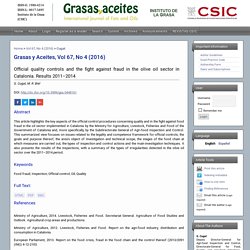
Results 2011–2014 G. Cugat, M. R. Biel DOI: Abstract This article highlights the key aspects of the official control procedures concerning quality and in the fight against food fraud in the oil sector implemented in Catalonia by the Ministry for Agriculture, Livestock, Fisheries and Food of the Government of Catalonia and, more specifically, by the Subdirectorate General of Agri-food Inspection and Control. Keywords. THE GUARDIAN 11/11/15 Extra virgin on the ridiculous: Italian olive oil producers accused of fraud.
Top Italian olive oil producers are under investigation for allegedly passing off lower-quality products as “extra virgin”, raising fresh concerns about allegations of consumer fraud in the industry. Turin police are examining whether seven companies – Carapelli, Bertolli, Santa Sabina, Coricelli, Sasso, Primadonna, and Antica Badia – have been selling virgin olive oil as 100% extra virgin. According to allegations in Italian press reports, an analysis of samples from all seven brands found that they did not meet EU labelling rules for extra virgin olive oil. One of the companies under investigation, Coricelli, said the inquiry was based entirely on taste tests by professional tasters that could not reliably discern whether the oil met industry standards.
“The protested batch, before being sold on the market, had been carefully analysed either by the company or independently recognised laboratories and all the analysis confirmed compliance to the quality standards,” Coricelli said. SLATE 30/01/15 Encore beaucoup de fraudes à l'huile d'olive. L’ Union européenne a dernièrement renforcé les contrôles et les sanctions en cas de fraude à l'huile d'olive, mais il reste quand même beaucoup de boulot. En France, c’est la DGCCRF (Direction générale de la concurrence, de la consommation et de la répression des fraudes) qui traque les manquements concernant les produits qui passent dans notre assiette.
L’huile d’olive ne fait pas exception, c’est un «secteur propice aux pratiques commerciales trompeuses». Pour obtenir les derniers résultats publiés le 29 janvier, 348 établissements ont été contrôlés, à tous les stades de la filière. Il y a d’abord beaucoup de problèmes d’étiquettes. ATLANTICO 30/01/14 Grosse arnaque à l'huile d'olive : la réglementation européenne sous influence du lobby agro-alimentaire.
LA TRIBUNE 12/11/15 En Italie, la fraude sur l'huile d'olive "extra vierge" est un scandale national. CONSOGLOBE 15/01/15 Fraude alimentaire. L’huile d’olive mieux que la cocaïne. Rédigé par Jean-Marie, le 15 jan 2015, à 15 h 41 min. PARLEMENT EUROPEEN 25/06/13 Proposition de résolution du Parlement européen sur la fraude et la falsification alimentaire dans le domaine oléicole. Le Parlement européen, – vu l'article 120 de son règlement, A. considérant que le mélange de différentes huiles afin de réduire le coût du produit, surtout dans le domaine de la restauration, est de plus en plus fréquent; B. considérant que le système actuel de contrôle et de prévention ne permet pas d'éviter une telle pratique et que l'huile est souvent servie dans des bouteilles non étiquetées et non scellées, qui favorisent les fraudes de tout type; C. considérant que conformément aux articles 114 et 169, le traité de Lisbonne protège les consommateurs à travers le droit à l'information et un niveau élevé de protection contre les risques et les menaces pour la sécurité et leurs intérêts économiques;
PARLEMENT EUROPEEN – Réponse à questions: E-000124/2011 Commercialisation frauduleuse d'huile d'olive.